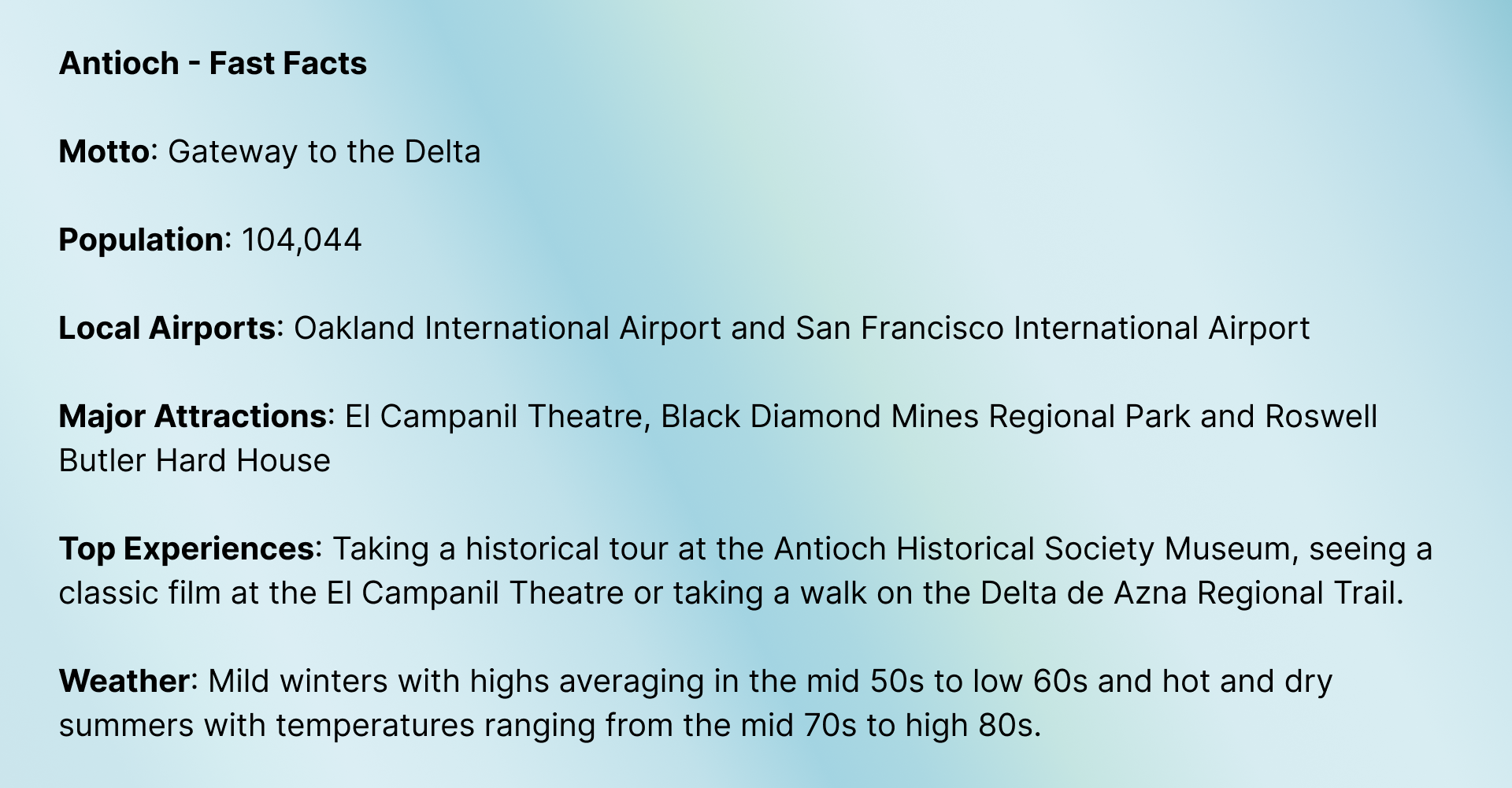 Named after the Biblical city of Antioch, Turkey in the 1800s, this California city in the San Francisco Bay Area is one of the oldest in the state, and began a center for coal mining and copper. It is home to over 100,000 people, including many commuters who work in Oakland and San Francisco and sits along the San Joaquin-Sacramento River Delta.
Named after the Biblical city of Antioch, Turkey in the 1800s, this California city in the San Francisco Bay Area is one of the oldest in the state, and began a center for coal mining and copper. It is home to over 100,000 people, including many commuters who work in Oakland and San Francisco and sits along the San Joaquin-Sacramento River Delta.
Contemplating a move to the Golden Coast? Let this guide offer you useful information about the city of Antioch, in order to assist you in making your decision to move. Once you have decided, you can start the moving process by getting a free quote on services right here at Movers.com
Antioch Climate
The weather is generally pleasant and dry in Antioch, with an average of only 13 inches of rain each year. The climate in the city is a mix of Mediterranean and semi-arid climate. Typically, residents in the area will experience hot, dry summers and mild, wet winters.
Winter weather occurs between November and February. These months average temperatures in the mid 50s to low 60s, but can occasionally drop to high 30s or mid 40s. Most of the rainfall happens during these months, and collectively averages approximately 55 days out of the year - giving the area over 300 days of sunshine annually.
Summer's hottest months are July and August, with average highs in the 80s and low 90s, sometimes reaching 100 degrees. September and October have average highs in the 70s and 80s, while March through May typically stays in the 70s.
Antioch Neighborhoods
Most of Antioch is residential, being dubbed a "bedroom" city for those commuting to work in Oakland, San Francisco and other neighboring cities. Crime rates have increased in many neighborhoods in the area over the last few decades, so you will want to find a neighborhood that is a bit more upscale.
The Nortonville/Stewartville area is made up of medium to large sized single-family homes. Single-family homes located in West Hartley are of similar size and price range (around $350,000 to $400,000), but many tend to be newer. These areas are also in close proximity to the Black Diamond Mines Regional Park.
Registering Your Car
In order to avoid any penalties after you've moved to Antioch, you must register your vehicle within 20 days or entry or residency, according to the state of California's DMV website. You will need an application for Title or Registration signed by the owner as they appear on the out of state title, the last issued out of state title, smog and weight certification (if applicable), any fees or taxes, and the vehicle must be inspected by the DMV.
Upon moving to California, you have 10 days to acquire a California driver's license. You will need to complete application form DL 44, give a thumbprint, have your picture taken, and provide your full name and social security number. You must also pay the application fee, pass a vision exam and pass a traffic laws and signs test.
Antioch Schools
The Antioch Unified School District serves public education in the city, and consists of four high schools, four middle schools and various elementary schools. In addition to these, the city is home to numerous private schools including Heritage Baptist Academy, Delta Christian High School, Promised Land Christian High School, Cornerstone Christian Academy, and more.
Antioch is home to Western Career College, located on Lone Tree Way, as well as a CPR and First Aid Training School. There's also Contra Costa Medical Career College and a Carrington College Antioch Campus.
Antioch Employment
In early 2013, the city's unemployment rate fell slightly to approximately 9 percent, just above the national average. Some of the city's top employers include: Kaiser Permanente, Antioch Unified School District, Sutter Delta Medical Center, Contra Costa County Social Services, Wal-Mart, City of Antioch and Target. The median income for a single-family household is approximately $65,000.
While many opportunities are located in Antioch itself in education and health care services, many residents choose to find work in the great San Francisco Bay Area, which is more metropolitan with a larger workforce.
Living Costs in the City
Since the weather is pleasant most of the year, your utility bills may reflect that living in Antioch; however, most other costs like housing, food and miscellaneous expenses are all over 10 percent higher than the national average.
Locals say the housing costs in the area are very high, and over the years it has become harder and harder for family living, with salaries sometimes not reflecting the increase in home prices in the area. The average listing price is approximately $300,000, and one-bedroom apartments begin around $1,000 per month.
If you have a considerable work commute, you'll need to factor this into your budget as well, being that gas prices are well over $4 a gallon and rising in most areas of California.
Antioch Moving Resources
Moving and storage companies are ready and willing to help you with your move to Antioch, whether you're moving from out of state or from another county in California. Make sure you get estimates from multiple moving services before you commit to hiring any (at least three estimates). Check back to our guides for tips on how to choose your moving service wisely with important questions to ask, differentiating between types of estimates, and mistakes to avoid. Visit the following pages at Movers.com to get quotes for the following services:
Antioch Transportation
The Bay Area Rapid Transit (BART) serves the city and is available at the Pittsburg/Bay Point Station in Pittsburg. The Antioch-Pittsburg Amtrak station also serves the city, and Tri-Delta Transit provides public transportation in the area as well.
The city does not have an airport of its own, but major airports like Oakland International, San Francisco International, San Jose International, Sacramento International and Stockton Metropolitan are all in close proximity. The Park areas of the city also contain approximately 11 miles of walking paths, which connect the communities to the various parks and schools in the city.
Major highways include California Delta Highway 4 and Highway 160.
Culture & Contemporary Life
There's plenty of outdoors to see and things to learn in this California city. Antioch has four places on the National Register for Historic Places, which include the Black Diamond mines, Roswell Butler Hard House, Riverview Union High School Building and the Shannon-Williamson Ranch.
At the Black Diamond Mines, you'll find 60 miles of trails with grassland, California Oak woodland and California mixed Evergreen forest - all perfect for someone who enjoys nature.
For more cultural experiences, you can see a show at the El Campanil Theatre, which opened in 1928 in downtown Antioch. Pick a classic movie, a live theatre show, the ballet, a symphony or a comedy show - this theatre shows it all.
The Arts and Cultural Foundation of Antioch organizes education in 3D art like sculpture and pottery, as well as graphic and performing arts if you're interested in learning a new craft.
Antioch Relocation Tips
-
Research your neighborhood carefully before moving, and visit it if at all possible. The crime in the area has spiked over the years, and you want to make sure the area you choose is safe for you and your family.
-
Antioch has plenty of outdoor space with a total of 31 parks, with 600 acres being city-owned -so be sure to pack your walking shoes.
-
This is a commuter city, so be prepared for a longer commute time due to traffic in the morning and evening. Try to leave at least 20 minutes earlier than scheduled for the first few days while getting used to the area.